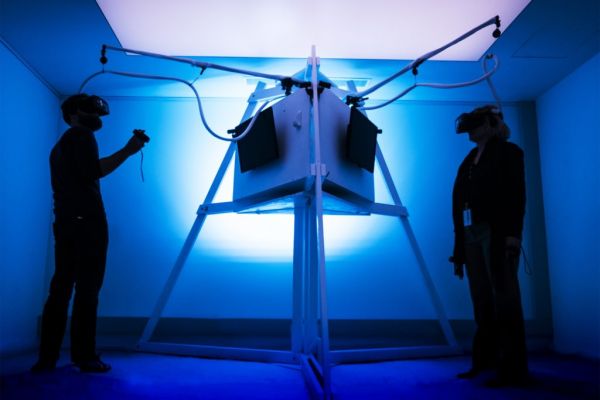Valentina Boschetto Doorly – futurologist and author of Who Owns the Future? – takes a hard look at hospitality’s post-pandemic problems and offers possible solutions.
This article was originally published in the Spring 2022 issue of Hospitality Ireland Magazine, in March of 2022.
‘Our workforce has walked out on us as though the house were on fire’ Sustainability is one of those words that goes through a three-stage life cycle: unheard of at first, received with suspicion after, and finally hurled into the top-ten ranking of celebrity words, as if a global control centre of media and minds had suddenly pressed the ‘now!’ button.
We are currently witnessing the transition from Phase II – when anyone who mentioned the word was framed as an unrepentant tree-hugger, preaching Franciscan frugality and going around with rough-sheep-wool half-gloves in the depths of winter – to Phase III: celebrity status. We will now be engulfed in a frenzy of ‘sustainability’ mentioned everywhere and about everything.
‘Sustainability’ is fast becoming the must-have attribute for any respectable business aspiring to upgrade its brand reputation to contemporary times. Nevertheless, this is just the very beginning of a long path that will, sooner or later, put us in front of transformative decisions, some of which will not be magically solved by innovation and technology, but will require changes in our lifestyles (and, yes, our industry will need to play its part).
Sustainability is automatically and almost exclusively associated with ‘environmental sustainability’ – that is, making choices that allow our businesses to exist and operate, delivering a neutral impact on resources. ‘Neutrality’ – a key word here – means that what we leave behind after we have created economic value through our activity matches what we had found there before. It’s a complex and far-reaching P&L that, if put down graphically, takes the shape of an intricate cluster, where the resources we use must be put back into the system, and where the sites that we inhabit must be kept in balance across all elements of the living and inorganic world.
If you think about it, this is a basic and wise approach that would allow us to avoid ending up like the inhabitants of Easter Island (Rapa Nui), a civilization extinct for overuse of finite natural resources. Back then, the residents of the island were not familiar with the notion of ‘negative externalities’. We are, as we studied it in third class, senior cycle, with Miss Doyle (Business Management).

House on Fire
However, sustainability also encompasses social and economic dimensions. A sustainable business is one that, given the current production factors available, can go on indefinitely, using and creating resources (all resources) in a balanced, give-and-take exercise.
It appears that, at the much-awaited restart of the entire hospitality and tourism industry, this has hit a widespread issue that will push the entire system out of kilter. Our workforce (of all ranks and skill sets) has walked out on us as if the house were on fire. This is not only an Irish problem, but an international one, afflicting Ireland and the UK as much as the USA, Italy as much as France.
So, what’s going on? How to fix it? Why is serving in the joyful circus of holidays, travels and events not appealing any more?
Bottleneck
Many employers in Ireland point to the PUP safety net, promptly deployed by the government, as a driving cause of the painful shortage of labour. Others highlight that the bottleneck was already evident before the Covid mayhem, and I can vouch for this reading, as filling positions in the hospitality industry was also a challenge in 2018, 2019 and earlier. Recruitment agencies had to organise scouting sessions abroad to appeal to foreign workers to come to Ireland, after which, finding suitable and affordable accommodation for them was a further headache.
But is the pandemic really the cause of the current conundrum, or is it just laying bare the true state of the matter? Are the restriction measures the cause or the precipitation factor of a tension that was already there? I believe we are looking at the second option: we were papering over an asymmetry of work treatments and opportunities that needed tackling anyway.
Working in our industry is magic and exciting, as much as demanding and exacting. It not only entails long hours of standing up, weekends and night shifts, and the pressure of dealing with all sorts of patrons, but the sector has been forever tainted with a reputation for low wages, estimated nearly 15% lower than another low-paying sector: retail. This is reflected all the way up to the top of the organisational chart hierarchy. It must be mentioned that the delightful addition of social-media fanfare, where every customer is turned into a publisher, has added an undeniable stress to our workforce, exposed to a magnitude of publicity for every small incident or glitch. Labour shortage will reshape several parts of the business, and the customer experience itself.

What will happen:
■ Automation and robot assistants will make inroads into large hotels located in the urban scene, and hotels geared towards corporate business and short breaks. Automation will keep growing at the front of house and in the back office, but automation cannot replace the Irish human touch that is expected to be truly part of the experience in most parts of the country.
■ Smart and fast: Check-in procedures can be trimmed and made less labourintensive with mobile check-in and/or automated self check-in.
■ Green rates: Hotels will start offering ‘green rates’, wherein clients get a discount or perks for stays that do without daily housekeeping. This is a way of turning a constraint into a marketing tool. Personally, I see it as a positive and overdue development: changing sheets and towels every day was an absolute nonsense, even for Lady Gaga, and it’s about time that customers’ expectations came down to Earth.
■ Wage inflation: There is no doubt that, if the demand-and-offer game still plays a role, we will see a robust increase in pay standards in our sector. This includes a number of other elements: sharper and more accurate KPI bonuses, extra rewards for night time shifts, etc.
■ Employee-centric, more wage inflation: Wage inflation will also include other initiatives to make the positions more appealing and improve retention. Employers will look at offering health insurance packages, pension saving schemes, and quality training opportunities, and extra effort will be made in securing accommodation support.
■ Room rate increase: It will be hard to avoid passing on the increases of pricing down the line, hitting the market with higher room rates. That is not good news for an industry decimated for two years that needs to recover courage.
■ Simplification: The hotel business model will have to be put under scrutiny to simplify processes and procedures in order to cut down labour hours. Elements such as breakfast will be slimmed and toned down in quantity and service in favour of quality and self-service.
■ Cost-cutting: “Less is more,” we like to say. When it’s time to return to profitability, we need to take a 360-degree look at everything we do, from lights left on in the bedroom, waiting for the client to check in, to soap dispensers in the toilets, to loyalty programme rewards aptly made lighter. Tweaking and trimming without compromising quality can deliver good results when rolling it out for 365 days a year.
■ Extra charging: Charging extra for early check-in or late checkout opens up a new income stream. Moreover, it opens up a window for a tweaking of the business model – something that we will explore in the next issue. The hotel becomes a hybrid concept and reaches out to new products and offers.

What needs to happen:
■ Reassess the organisational chart: Organisational charts need to take a deeper and more layered structure. More hierarchical levels allow the staff to aspire and undertake career progression. Flat-aspancakes organisational charts may be easier to manage, but look unattractive to candidates.
■ Reinvent and relaunch a glowing and appealing vocational school system for the sector – a training system that acts as a general recruiter for the entire country’s industry, offering leading-edge, innovative standards of contents and experiences.
■ Allow our workforce salary rates to go up. It is unavoidable, it is time, and it’s the only way to leave behind the bad reputation and recover appeal. Unfortunately (fortunately), Ireland’s salary standards are very high, and competition amongst industries is stiff. We need to bite the bullet.
■ Smarten up our business models by creating a more versatile, resourceful concept that will hybridise with other sectors and open up to new purposes (more on this to come).
■ State strategic support: Inland and remote locations need to be supported with a strategy choice that allows revenue to incentivise the staying, living and working in those areas that may be hot spots for tourism, but less appealing for permanent residents.
Drop shadow ageism: The European demographic make-up is experiencing a tectonic shift. In 2020, already more than one fifth (20.6%) of the population was aged 65 or over, and the situation is evolving fast in the direction of a very aged society – aged, yes, but able, capable, and willing to work – so it’s time we drop the approach that favours the young and open up our gates to different age segments without (unspoken) bias.
■ Flex ‘ways of working’ to accommodate Gen Z: The new generation of staff that is coming in through the application process thinks differently and reacts differently. So should the employers.
On this last point, Kathleen Linehan, strategic director of human resources at the Trigon Group in Cork, gives us an overview of new initiatives in the company. Here, a new and well-thought-out induction programme has been put together, wherein training is delivered through a ‘blended’ programme that includes both in-person training and online sessions. A library of video tutorials has been made available, in order to allow the new recruit to self-administer the modules in his/her own time. The new staff member is also assigned to an ‘onboarding ambassador’, a sort of senior staff member acting as a mentor for the first period in. Linehan also warns that this generation appreciates regular feedback and dislikes being exposed to unexpected situations or negatives. A personalised and soft approach to management seems to go down better. Similarly, fast-track progression is expected, and organisational charts must adapt multiplying paths and levels, to make it possible.
People want to work. People love to work if there is a job out there to be loved. All sociological research done across the globe on the issue points to the evidence that being employed has a directly positive correlation with happiness. Working makes us happy because it gives us economic independence, a social status, a place in the world. Most importantly, work makes us feel that we are contributing to something, and we need that to give purpose to our lives.
So, let’s not fool ourselves: the industry needs to reassess its HR mechanics and standards, and, no doubt, it will be attractive again. Ireland already tops the chart of European fairness when it comes to labour sustainability. One needs only to have a look at the European map of minimum wage. Some countries, like Italy, don’t even have one, leaving work conditions in some industries exposed to all sorts of abuse.
Ireland has a caring and progressive attitude that rewards talent. With just one step forward in the right direction, we will be able to create an upgraded, up-to-date labour offer. Then, the proposition of joining the happy brigade of tourism and hospitality will be made an enticing one again. Fáilte.
Eurostat, 2021, Minimum wages across European countries, euro per month.
FACT SHEET:
■ Some 70,000 workers have left the Irish restaurant sector alone since the onset of the pandemic.A systemic shortage of 7,000 chefs is repeatedly denounced.
■ Some 30% of the entire workforce of the hospitality industry (260,000 people) is poised to have left the sector to join other ones (e.g. retail, logistics, healthcare).
■ Research done in the industry tells us that nine out of ten businesses in Ireland were experiencing difficulty in recruiting before the pandemic.
■ We jump to over 700,000 positions remaining as a floating unfulfilled number in the hospitality industry in the US because of the great workforce exodus to other sectors.
■ Some 200,000 workers have gone AWOL in the Italian tourism and hospitality industry, leaving the majority of businesses understaffed and desperate to find new candidates.
■ Some 140,000 French workers have changed sector in the last two years, bleeding the sector in a similar way.
Read More: Hospitality Ireland Spring 2022: Read The Latest Issue Online!








